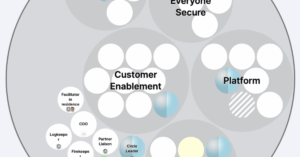

2023-12-06
In any SaaS business, be it a startup, scale-up or corporate venture, the importance of an efficient development team cannot be overstated. While your developers focus on creating features that bring customer value, having mature DevOps processes and a cloud-based Internal Developer Platforms (“IDP”) in place is critical to enable agile development and rapid deployment of new user functionality.
As these SaaS companies scale, a crucial decision arises sooner rather than later: invest in building an in-house DevOps and Platform team, or opt for outsourcing?
The path to forming an in-house DevOps and Platform team is fraught with obstacles. This includes the struggles of recruitment, the high cost of skilled profiles, retention concerns, ongoing training requirements, and the need to stay abreast of evolving practices.
Are you sure you want to invest your money, time and energy in that right now?

DevOps practices and an Internal Developer Platform may not present any direct value to the SaaS customers, they are in fact the foundation to creating a competitive edge in the digital product arena. Their impact is far-reaching, improving everything from time-to-market and deployment frequency to quality of service, customer satisfaction and cost-efficiency. Essentially, DevOps teams and Internal Developer Platforms don’t just support developers; they empower them.
Developers and in-house DevOps and Platform teams often find themselves ‘reinventing the DevOps wheel’;
deciding on tools, integrating them, and so on. During this journey they encounter issues already resolved by more experienced teams. Looking across SaaS companies, developers’ needs around DevOps and Internal Cloud Platforms tend to converge. Many of those companies have the same needs. Why invest in solving them again yourself?
Outsourcing DevOps and entrusting your Internal Development Platforms offers many benefits: lower cost, stable and dependable teams, direct access to a wide array of skills and expertises, and scalability of services. Clients that opt to outsource benefit from proven, battle-tested technology choices and best practices to common problems. In the end companies choosing DevOps-as-a-Service gain a senior, mature and experienced team from day one, all at a lower cost compared to building their own in-house DevOps and Platform team.
“Since switching to DevOps-as-a-Service with Skyscrapers, we can focus again on building our business and no longer need to worry about the platform. Skyscrapers has a team of cloud experts supporting us every day, delivers a better platform and saves us money. The migration was effectively a non-event and completely painless.”
Olivier Stiévenart – CTO Optimy
Right from the start, DevOps-as-a-Service integrates all expertise SaaS companies are looking for: Cloud Native technologies and best practices, cloud platforms like AWS, while also meeting critical requirements around cost control, security, CI/CD, compliance and disaster recovery/business continuity (“DR/BC”). The teams offering DevOps-as-a-Service don’t just understand these elements well; they specialise in them.
SaaS companies evaluating DevOps-as-a-Service might have some concerns, ranging from security and control to communication and intellectual property. However, these apprehensions are effectively addressed through robust security practices, including GDPR compliance, clear agreements outlining responsibilities, as well as guaranteeing clients retain all intellectual property when offboarding. Communication is streamlined using tools like Slack and GitHub, ensuring seamless integration with development teams.
DevOps-as-a-Service is not just a service; it’s a strategic decision for SaaS companies seeking to move faster, aim to stay agile and to be competitive in their market. It offers a blend of efficiency, expertise and cost-effectiveness that in-house teams struggle to match.







